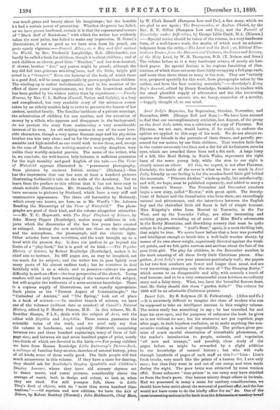Aunt Judy's Magazine, for September, October, November, and December, 1880.
(George Bell and Sons.)—We bare been amused to find that our uncomplimentary criticism, last August, of the group on the Aunt Judy cover, was a criticism of a copy of Flaxman. But Flaxman, we are sure, would hasten, if he could, to endorse the epithet we applied to this copy of his work. We do not always re- cognise our friends in the portraits of them drawn, and proudly pre- sented for our notice, by our little children. That wooden little face in the centre owns only two lines and a dot for all its features, save its eyes, which are awarded three lines and a dot each. A large lump of a hill, like Moel Hebog, in North Wales, represents the right knee of the same young lady, while the arm to our right is clearly minus an elbow. All this, we expect, is not after Flaxman. Certainly, the inside of the cover is what we like so much in Aunt Judy, friendly as our feeling is for the wooden-faced little girl behind the mountain. "Princess Alethea " winds up sadly, but satisfactorily, and will, we hope, soon be published separately, and added to many a little woman's library. The November and December numbers begin a new story, called "Hector," with great spirit. The descrip- tions of Salaret and the Grand'mere who lives there, are exceedingly natural and picturesque, and the interviews between the English boy and the shrivelled little old Scenr is fall of simple humour. Miss Kingsley's rides from Merced to Yosemite, in the Far West, and up the Yosemite Valley, are other interesting and exciting papers, reminding us of some of Miss Bird's adventures in the Rocky Mountains, and describing scenery that must be quite unique in its grandeur. " Arel's Bear," again, is a most thrilling tale, that might be true. We never knew before that a bear was powerful and intelligent enough to break into a well-built wooden shanty, by means of its own sheer weight, sagaciously directed against the weak- est points, and we felt quite nervous and anxious about the fate of the poor little girl. The play for children, in the December number, is the most amusing of all these lively little Christmas pieces. Alto- gether, Aunt Judy's new year promises particularly well ; the papers in her two first numbers are fewer and longer than usual, and are very interesting, excepting only the story of "The Sleeping Booby," which seems to us disagreeable and silly, with scarcely a touch of real humour, and to be a very unsuccessful cross between an ordinary story and a fairy-story. What, too, have the beautiful flowers done, that Mr. Getty should dab them "garden dolls ?" The volume for 1880 will be an admirable Christmas present.






































 Previous page
Previous page